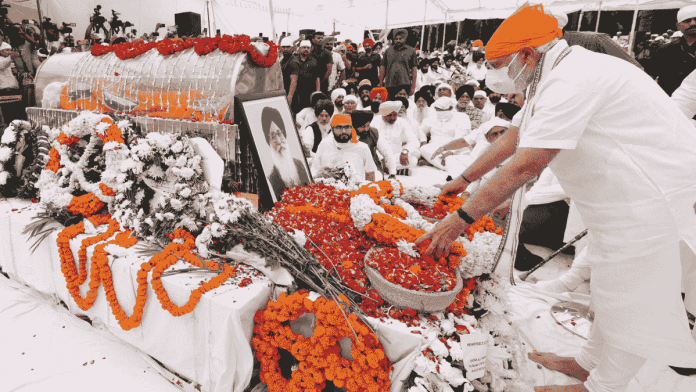Chandigarh: Prime Minister Narendra Modi paid a glowing written tribute to five-time Punjab chief minister Parkash Singh Badal in a rare gesture Friday, recalling the special relationship that he shared with the doyen of Punjab politics.
The 95-year-old Akali patriarch Badal passed away Wednesday evening at a private hospital in Mohali. The PM made it a point to reach Chandigarh Thursday morning to offer his condolences on Badal’s death, meeting his family and paying homage to his mortal remains at the Shiromani Akali Dal’s office.
In a write up published on the Op-ed page of The Tribune — a leading regional daily of Punjab — Modi said that with Badal’s demise, he had lost a father figure, someone who had guided him for decades.
“In more ways than one, he shaped India’s and Punjab’s politics, and that can be described as unparalleled,” wrote Modi. “That Badal sahab was a big leader is widely accepted. But, more importantly, he was a big-hearted human being. Being a big leader is easier but being a big-hearted person requires a lot more. People across Punjab say — there was something very different about Badal sahab! (‘Badal sahab ki baat alag thi’).”
Recalling the personal equation that he shared with Badal, Modi wrote that he got to know the leader in the 90s, when he was involved in party work in north India.
“Badal sahab’s reputation preceded him — he was a political stalwart who had been Punjab’s youngest chief minister, a Union cabinet minister and someone who held sway over the hearts of crores of Punjabis across the world. I, on the other hand, was an ordinary karyakarta. Yet, true to his nature, he never let this create a gap between us,” he wrote.
Discussing Badal’s insistence on an alliance with the BJP to ensure peace and communal harmony in Punjab, Modi wrote that in the mid and late 1990s, the political climate in the state was different, having seen years of militancy.
Referring to the 1997 assembly election, he wrote, “Our parties (SAD and BJP) went to the people together and Badal sahab was our leader. His credibility was a key reason that the people blessed us with a resounding win. Not only that, our alliance successfully won the municipal elections in Chandigarh and also the Lok Sabha seat in the city. His persona was such that our alliance went on to serve the state for 15 years between 1997 and 2017.”
Having first tied up with the Jana Sangh — the predecessor of Modi’s Bharatiya Janata Party (BJP) — in 1967, Badal’s SAD joined hands with the BJP and the NDA in a pre-poll alliance before the 1997 assembly election. Although it had its share of ups and downs, that alliance remained firm until 2020, when the Akalis finally broke away over differences of opinion over the Modi government’s now-repealed farm laws.
Also Read: SGPC chief Dhami attacked in Mohali at protest demanding release of Sikh prisoners
One of the ‘tallest kisan netas’, had ‘love for cows’
Recalling an incident following the SAD-BJP alliance’s historic 1997 victory in Punjab, Modi recalled the time they went to Amritsar together.
“I was in my room at a guest house but, when he got to know of this, he came there and began to pick up my luggage. I asked him why he was doing this, to which he told me that I would have to come with him to the room meant for the CM and stay there only. I kept telling him that there was no need to do this, but he insisted. Eventually, this is exactly what happened and Badal sahab stayed in another room. I will always cherish this gesture of his towards a very ordinary karyakarta like me.”
Calling Badal among the tallest kisan netas of our times, he wrote that agriculture was “his real passion”.
“Whenever he spoke on any occasion, his speeches were filled with facts, latest information and a lot of insight,” he wrote, adding that Bada had a very special interest in gaushalas too and kept cows of various breeds.
‘Punjab first and India first’
The prime minister said that after 2001, he got to interact with Badal in a different capacity — as chief ministers of their own states.
“I was blessed to receive Badal sahab’s guidance on numerous issues, especially those related to agriculture, including water conservation, animal husbandry and dairy farming. He was also someone who believed in tapping the potential of the diaspora, considering that there are so many hardworking Punjabis settled overseas,” wrote Modi.
Modi said that after his National Democratic Alliance government came to power at the Centre in 2014, Badal provided valuable insights based on own experience in governance.
“At a larger level, his contribution to our nation is indelible,” he wrote. “He was among the bravest soldiers for the restoration of democracy during the dark days of the Emergency. He himself suffered the highhandedness of the imperious Congress culture when his governments were dismissed. And, these experiences only made his belief in democracy stronger.”
During the turbulent period of the 1970s and 1980s, Badal put “Punjab first” and “India first” and steadfastly opposed any plan that would weaken India or compromise the interests of the people of Punjab, “even if it meant loss of power”, wrote Modi.
Badal, he wrote, was a person who brought people together and could work with leaders of all ideologies, and the void left by his demise will be hard to fill.
“He never associated any relationship with political gains or losses. This was particularly useful in furthering a spirit of national unity,” he wrote. “Here was a statesman whose life witnessed many challenges but he overcame them and rose like a phoenix. He will be missed but he will live on in our hearts and he will also live on through the outstanding work he has done over the decades.”
(Edited by Uttara Ramaswamy)






